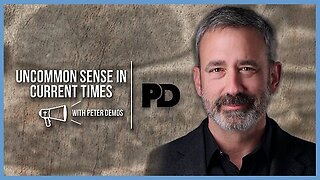Premium Only Content

Real Estate Paradox: High interest rates but also high prices
Real Estate Paradox: High interest rates but also high prices
Can you guess the thing that American report they want the most out of life? It is homeownership.
This is lies at the heart of the American dream. However, the American dream has rarely ever been this hard to attain. Prospective homeowners face a triple threat of high prices, costly mortgages, and low housing supply. This had led to a feeling in the country that home ownership is unaffordable and there is little sign of this changing in the future.
Housing is usually some of the most sensitive sectors to interest rates. However, economics has never been so convoluted as today.
After the Federal Reserve went on the offensive against interest rates, mortgage rates soared from 3% to 7% in less than two years. The mortgage payment for the median home doubled from roughly 14% of monthly income in 2020 to nearly 29% in June. This is the highest rate since 1985.
What is perplexing is that the jump in mortgage rates has not led in turn to a decline in house prices. While home prices dipped briefly when interest rates began to rise, they rebounded to record highs shortly thereafter. This rebound seems to be gaining strength. When you annualize second quarter home prices, they rose at a pace of 15%.
The American property market has approximately $2 trillion in sales annually. Some regions are flourishing while others are contracting. The CEO of one of the biggest homebuilders, Toll Brothers, said that “there are still buyers out there. They have very few options.”
While there has been a decrease in demand for homes, this has been offset by a decrease in supply.
The 30 year fixed mortgage is something unheard of in most of the world but it is viewed as a constitutional right in America. This is enabled by Fannie Mae and Freddie Mac, two government backed firms, buying mortgages from lenders and securitizing them. Long term fixed rate mortgages allow American to buy homes. However, these long term rates are now an impediment. People with low mortgage rates effectively have golden handcuffs that prevent them from selling their properties because they would lose their favorable loans. Redfin estimates that 82% of homeowners have mortgage rates below 5%.
You would think that the decline in real estate transactions would hurt the economy, but that does not seem to be the case. American homeowners, refusing to give up their mortgage loans, have resorted to fixing up their current homes. This has been further reinforced by remote work. Remodeling expenditures increased 40% from 2019 to nearly $570bn in 2022.
Many people have decided to build new homes rather than purchase an existing home. This is partly because new construction is more readily available than existing homes. In fact, newly built homes account for nearly one-third of active listings this year.
Homebuilders have been offering incentives to buyers including the ability to “buy down” as much as 1.5% on mortgage rates by paying a one-time fee upfront. This can be the equivalent of knocking 6% off the selling price of a home. This may actually be a smart move for homeowners if interest rates remain elevated. The low interest rate environment that has existed for year is a peculiarity that is not in line with historical interest rates. Interest rates now are more in line with historicals, and this may lend credence to the idea that they will stay elevated for some time. I would advice you not to count on the fact that you will be able to refinance in the next couple years to a rate less than 5% unless there is grave economic turmoil.
Many analysts, including myself, are wondering how long real estate price resilience can continue. Mortgage rates are likely to climb higher as the Federal Reserve increases interest rates. However, the higher interest rates go, the more real estate demand falls. This may encourage lenders to offer riskier deals to capture business. If the real estate market remains strong, it is the Federal Reserve that will be tested. A strong housing market contributes to an overheating economy. This relationship is not straightforward because property values tend to show up in inflation gauges in the form of rent. Rents have decline somewhat, and that is now starting to filter through to inflation measures.
The future is uncertain. There are a record number of apartment building under construction, and this should reduce rents. However, you also have a very unaffordable housing market that is pushing prospective buyers to the rental market instead of purchasing a home. What I can tell you is that as long as interest rates remain so high, Americans will have to defer their dream of homeownership.
Works Cited:
https://www.economist.com/finance-and-economics/2023/08/30/how-can-american-house-prices-still-be-rising
Tags:
real estate, real estate market, real estate crash, housing market, real estate market today, real estate investing, real estate market predictions, housing market 2023, housing market crash, stock market, real estate 101, real estate agent, how to invest in real estate, housing market forecast, real estate bubble, real estate 2023, us housing market, stock market news, investing in real estate, how to make money in real estate, real estate agent tips, real estate agent 2023, real estate investment, real estate code, real estate in 2023, real estate broker, real estate school, real estate canada
-
 4:21
4:21
The Last Capitalist in Chicago
11 months agoWhat is the Hume-Cantillon Effect?
2221 -
 3:56:31
3:56:31
JakeParker
7 hours ago $13.91 earnedJakeParker is LIVE on Rumble
50.5K -
 8:09:23
8:09:23
SpartakusLIVE
9 hours ago $23.77 earnedThe Duke rallies squad for LAUGHS into the night with a SMATTERING of TOXIC banter
83.4K17 -
 1:03:51
1:03:51
Flyover Conservatives
1 day agoGeneration Z’s Revolution: 17 Year Old Author on the Return of Faith, Family, and the End of Feminism - Hannah Faulkner; Economic Update - Dr. Kirk Elliott | FOC Show
46.2K2 -
 1:12:43
1:12:43
Adam Does Movies
11 hours ago $20.94 earnedMoviegoers Are Singing Now! + Lilo & Stitch + Sonic 3 - LIVE!
81.5K7 -
 1:26:05
1:26:05
Donald Trump Jr.
14 hours agoRegime Media Imploding: What’s Next for MSNBC? Plus Michael Knowles & Alex Marlow | TRIGGERED Ep.194
232K227 -
 37:26
37:26
Glenn Greenwald
11 hours agoGlenn Takes Your Questions: On Trump's Cabinet, The G20 Summit, and More | SYSTEM UPDATE LOCALS SPECIAL
90.5K55 -
 2:10:20
2:10:20
We Like Shooting
18 hours ago $2.67 earnedWe Like Shooting 586 (Gun Podcast)
24.4K1 -
 52:14
52:14
Uncommon Sense In Current Times
13 hours ago $0.84 earned“Pumpkin Pie Politics: Bridging the Thanksgiving Divide to Protect The Family"
18.1K1 -
 1:01:28
1:01:28
The StoneZONE with Roger Stone
8 hours agoWhy Jack Smith Owes Americans Millions of Dollars for Fake Investigations | The StoneZONE
38.9K9